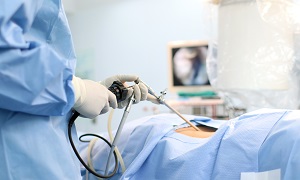Nephrectomy
Nephrectomy is a surgery that is performed to remove parts of or all of one of your kidneys. The kidneys are vital organs which filters water as well as waste products from your blood. They produce certain hormones as well.
A nephrectomy is done when the kidney is damaged, your kidney is no longer functioning properly, you are having kidney cancer or if you are donating your kidney. Doctors may remove the kidney through open surgery or laparoscopically. Laparoscopic surgery involves smaller incisions and its recovery time is quite faster. Usually, complete recovery from nephrectomy takes several weeks, and it can be sometimes very painful. Complications as well as infections are also possible, though the outlook is usually good.
Why it is done
Removing a kidney or part of a kidney is usually done for two reasons.
Damaged kidney: If your kidney is not functioning properly, it may require removal. If it gets damaged or scarred, it can be another reason for the removal. This might be due to disease, injury or infection. Sometimes a kidney is also removed due to cancer; however, if the tumor is small and detected early, only a part of it might need removing.
Donating Kidney: Sometimes, a person can donate their healthy kidney to someone, who requires a new kidney. Kidney transplants are usually more successful with kidneys from living donors rather than deceased donors.
Preparation
Before surgery, you will need to talk with your urological surgeon regarding the options which are available for you. You need to inquire whether you will need a partial or complete nephrectomy. You also need to ask whether you are a candidate for a minimally invasive procedure. You may also want to ask whether a complete nephrectomy is required or if a partial one is possible.
Depending on the type of procedure that will be performed, you might need to stay in the hospital from one night to a week or maybe more. Talk to your surgeon as well as your healthcare team regarding your probable recovery time.
On the day of and before the surgery, you will be given instructions regarding what you will need to do. You should ask your doctor any questions you might be having such as when you need to begin your fasting, whether you can prescription medications, etc.
Procedure
The procedure is performed with general anesthesia and you will receive it before the surgery so that you won’t feel any painful sensation during the procedure. You will also have a urinary catheter, a small tube that will be draining your urine from your bladder, placed before your surgery. The urological surgeon and anesthesia team work together to minimize the pain you feel after the surgery is done.
Depending on how the surgery is performed and how much of the kidney has been removed, the nephrectomy procedure can vary. The variations include:
Laparoscopic surgery
Robot-assisted laparoscopic surgery
Robot-assisted laparoscopic surgery is a variation of laparoscopic surgery, where the surgeon will be using a robotic system for performing the procedure. Robotic tools require very small incisions, as well as provide better 3-D images during the procedure and they can also make fine or complex motions similar to what a surgeon’s hand can do in open surgery.
Open surgery
Radical nephrectomy
In radical nephrectomy, the surgeon removes the whole kidney along with the fatty tissues around the kidney as well as a portion of the tube that connects the kidney to the bladder. The surgeon might remove the adrenal gland which sits atop the kidney if a tumor is close or involves the adrenal gland. Lymph nodes or other tissues are also removed in some cases.
Partial nephrectomy
In a partial nephrectomy which is also called kidney-sparing surgery, the surgeon removes a cancerous tumor or diseased tissue and leaves in as much healthy kidney tissue as they can.
Before your surgery, it is important that you discuss with your urological surgeon regarding the advantages and disadvantages of robotic or other types of minimally invasive surgery.
Risks
Though nephrectomy is generally safe like any other surgery, it carries a potential risk of complications such as infection, bleeding, injury to nearby organs and in rare cases, some other serious problems.
Overall kidney function decreases after nephrectomy, but the kidney tissue works well enough for the person to live a healthy life.
Long-term reduced kidney function can however lead to high blood pressure or chronic kidney disease. It is also important that you discuss with your surgeon, regarding these issues.
After the Procedure
Your recovery time will depend on the type of procedure that was performed as well as your overall health. The urinary catheter will remain in place during your recovery for some time.
Before you leave the hospital, you might be given a few instructions regarding your diet and other activities. For the first several weeks, it is important that you avoid any kind of strenuous activity or heavy lifting.
For the majority of patients, such procedures don’t affect their quality of life and they are able to return to their normal routine once they are fully recovered.
Though you will most likely be able to function well with one kidney, you should consider checkups to monitor a few factors which include:
- Blood pressure- Careful monitoring of your blood pressure is important as a decreased kidney function might lead to an increase in blood pressure, and high blood pressure can further damage the kidney.
- Protein urine levels- High protein urine levels (proteinuria) usually indicates kidney damage and/or poor kidney function.
- Waste filtration- Glomerular filtration rate measures how efficient your kidney is in filtering waste. The test is usually performed with a sample of blood for measuring the creatinine level. If the filtration rate is reduced, it is an indication of decreased kidney functions.


